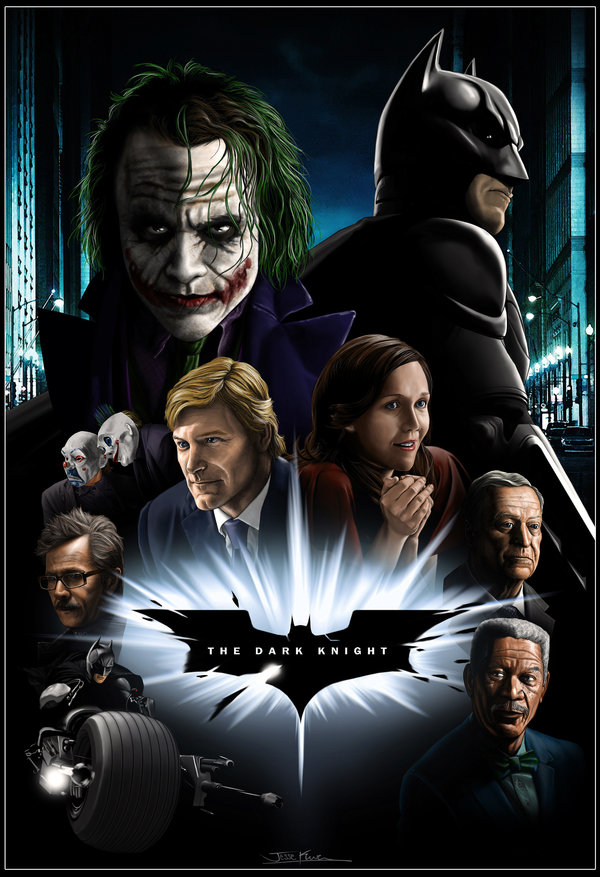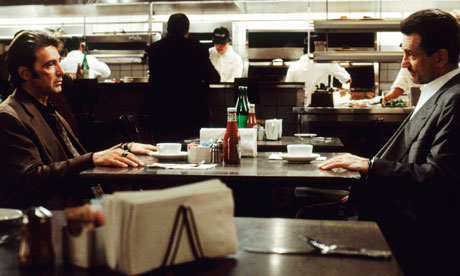The Dark Knight is not simply a comic book film. In fact, it strives to separate itself from the likes of Spiderman and The Hulk by allowing its focus to delve deep into the heart and soul of numerous and diverse individuals. It is a film about choice, morality and idealism, and how these factors can begin to weigh upon the lost and isolated individual.
The Dark Knight does not feel like a comic book film. It does not call attention to its comic book origins but rather bases itself in a realistic time period that could be representative of anywhere in the world. Much like Ironman, the Dark Knight is about character and motivation before it is about action and spectacle. The film strives to tell a story that is fun in a fantastic sense but also can be understood as a commentary on present day choice of right and wrong in a morally confused world.
The Conflicted World of Batman
The one thing that has always been a virtue about the Batman franchise is in its focus on the conflicted mind of Bruce Wayne/Batman (Christian Bale). Bruce Wayne is an idealist who believes he can alter the world’s crime ridden roots through the donning of a mask and cape. But how far will he proceed with it? This is the question that is at the heart of the story of The Dark Knight.
His struggle with his sense of duty is truly put to the test in this film by many facets of Gotham City, but none more powerful then the likes of the psychopathic and antagonistic mind frame of The Joker (Heath Ledger). Within the first five minutes of the film, the audience is quick to ascertain that this is not the same Joker as Jack Nicholson undertook only 19 years earlier in Tim Burton’s Batman.
The Joker is not played for laughs by the late Ledger, but rather as a character who believes in tipping the scales of structure and balance. He is not in it for the money (which is emphasized in a scene that will be truly difficult for a capitalist to watch) but rather is an instigator and a threat to the goal of a morally structured world. Things are not simply black and white, and the character of The Joker is quick to point this out. He alters certain individual’s perceptions and forces them to become entities of their psyche that they may not want to admit they possess. Though his screen time presence is lacking, during the times in which he does appear onscreen becomes a highly intoxicating treat and truly works as the best moments of this film. He is utterly unforgettable and, dare one say it, the best Joker ever.
A Little Too Much?
The film is over two and a half hours long but it never feels lengthy. It packs so much in that it would be difficult to cut anything out. However, at times, it seems that Nolan may be in over his head with too many plots and characters. One of the casualties of the script is Rachel Dawes (Maggie Gyllenhaal- who has replaced Katie Holmes from the original film, and who is a much better actress), who is severely underwritten. Her role from the first film as a tough minded district attorney is shelved here in favor of her becoming the idealized woman caught in a love triangle. Both Bruce Wayne and her new boyfriend Harvey Dent (Aaron Eckhart) vie for her heart strings as her character simply goes through the motions of choice. With that being said, the love story comes off as simply weak in the face of other much more rousing plots.
The Darkness of the Film
The Dark Knight does live up to its title. It is extremely dark (though the city is not as malicious looking as it appeared in the first film). The violence at times is stark and unrelenting, but in a non-exploitive sort of way. It mirrors the society thatGothamCityhas become. The city has spawned violence as a result of its own corruption and misdeeds. It truly captures the understanding that violence begets violence.
GothamCityis a barren landscape and, as a result, contains only three men willing enough to take on the role of cleaning it up. In the film, all three men represent different modes of the male perspective. Harvey Dent is the idealist who believes change can occur through effort and determination. Batman, on the other hand, desires alterations but is conflicted on how to go about achieving it. Lieutenant Gordon (Gary Oldman) covets modifications but is also a man who understands the corruption and decay that probes the individual. He is an idealist but with a greater sense of awareness and understanding then Dent and Batman. These three characters help to complete each other and yet remain individualistic in their beliefs and actions.
Christopher Nolan, the director, has achieved a tremendous feat with his latest release. He has taken a film franchise which only ten years ago was mocked and ridiculed and turned it into something artistically respected. It has rejuvenated the series and, as a result, has become the best franchise going at the present moment. For all of its minor problems, this entry is sure to entertain the masses. The film has a rousing score and contains performances that are truly great, but at times is overshadowed by all of the great action sequences (which may or not may be a bad thing?).
Though the film does sort of lose itself in the final thirty minutes, it still does leave the viewer with great expectations for a third entry in the series. Perhaps the anticipation will not be as tantalizing as the original films ending (with the introduction of the Joker playing card), but it does add another depth to the already impressive lengths this franchise is attempting to strive for. Let the anticipation begin.



